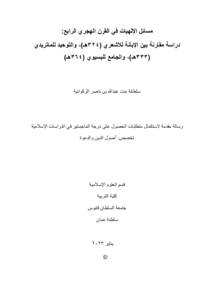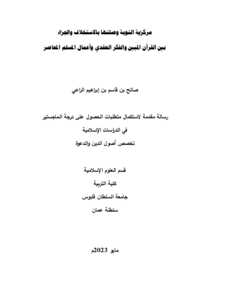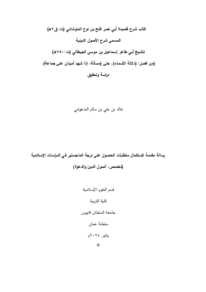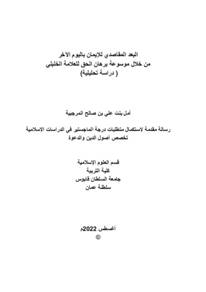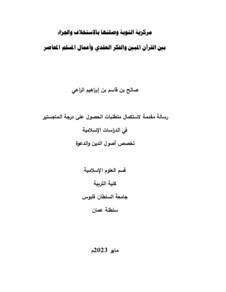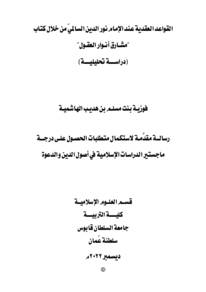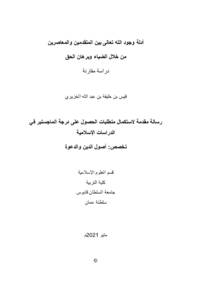وثيقة
مسائل الإلهيات في القرن الهجري الرابع : دراسة مقارنة بين الإبانة للأشعري (324هـ)، والتوحيد للماتريدي (333هـ)، والجامع للبسيوي (364هـ).
عناوين أخرى
Theological Issues in the Fourth Hijri Century : a comparison between Al-Ibaanah of Al-Ash'ari (324 AH), Al-Tawhiid of Al-Maaturidi (333 AH), and Al-Jami' of Al-Basyawi (364 AH)
الناشر
جامعة السلطان قابوس.
ميلادي
2023
اللغة
العربية
الموضوع
الملخص الإنجليزي
This study comparatively dealt with theological issues studied by
three scholars of the fourth Hijri century, namely Al-Ibaanah of Al Ash'ari, Al-Tawhiid of Al-Maaturidi, and Al-Jami' of Al-Basyawi. In
chapter one, the study focused on addressing the doctrinal issues
and their proofs related to existence, monotheism, and knowledge
among Al-Ash'ari, Al-Matridi, and Al-Basawi. In chapter two, the
study analyzed Al-Ash'ari, Al-Maturidi, and Al-Basyawi's points of
view concerning the Holy Names and Attributes, and their
methodologies in dealing with this issue.
Among the most important findings of the research is that
knowledge is based on reasoning with the three imams, and it is
mainly linked to evidence. Al-Ash'ari did not pay much attention to
issues related to knowledge in his book Al-Ibana, although he
mentioned it in his book Al-Lum'a. As for Al-Maturidi, he described
the means and methods of knowledge in detail. Whereas Al Basyawi only mentioned sight and reasoning as the main methods,
proving it by verses from Holy Quran. Al-Maturidi and Al-Basawi
tackled the evidence for the existence of God Almighty in detail,
and mentioned among them the evidence of occurrence, and the
evidence of indicative impact of the influencer. The research
showed the imams' discussion of the followers of other religions
namely Aeonism, Shamanism, Sophistisism, Dualism,
Manichaeism, Disanism, Marcionism and Magi . Al-Maturidi
discussed these religions extensively by mentioning the origins of
their beliefs and, then, between their opposition to reason and text.
While Al-Basiwi mentioned a brief glimpse of the origin of the belief
in secularis, dualism and their corruption. The three scholars dealt
with the topics of the Names and Attributes, and the three of them
agreed in proving the Attributes, but they differed in their relation
to the essence. Al-Ash'ari tends to believe that it is neither he nor
anyone else. Al-Maturidi and al-Basawi tend to believe that God's
attributes are the essence of the essence. Each one of them cited
his evidence in the matter and his discussions for his opponents.
They differed in dealing with the topic of declarative attributes
because of the different ways of dealing with the Qur'anic text. Al Ash'ari follows the path of delegating the meaning without
interpreting it as the "principle of bilaa kayf". Al-Maturidi interpreted
the istiwaa'and proved the vision of God, while al-Basawi goes to
endorse the interpretation in dealing with the topic of similar
attributes, because the apparent to him is delusional analogy.
المجموعة
URL المصدر
الملخص العربي
تناولت هذه الدراسة القضايا العقدية المتعلقة بالإلهيات التي درسها ثلاثة من أئمة علماء القرن الهجري الرابع مقارنة بين ثلاثة كتب: الابانة لألشعري، والتوحيد للماتريدي، والجامع للبسيوي. واهت ّمت الدراسة في فصلها الاول بمعالجة القضايا العقدية المتعلقة بالوجود والتوحيد والمعرفة عند الاشعري والماتريدي والبسيوي ومناهجهم في الاستدلال عليها. أما في الفصل الثاني فقد سعت الدراسة إلى تحليل مقالات الاشعري والماتريدي والبسيوي في مباحث الاسماء والصفات، وآليات استدالالتهم عليها. ومن أهم النتائج التي توصل إليها البحث: إن المعرفة متأ ّسسة على الاستدلال عند الائ ّمة ّم الاشعري بالمسائل المتعلقة بالمعرفة في كتابه الثلاثة وأنها مرتبطة بالدليل أساسا. إذ لم يهت الابانة، وإن كان ذكرها في كتابه اللمع، أما الماتريدي فإنه ف ّصل في ذكر وسائل المعرفة وطرقها، واقتصر البسيوي على ذكر طريق النظر والاستدلال، مبينًا أنه أساس الطرق الاخرى، مؤكدًا ذلك بالشواهد القرآنية، وقد اتفق كالهما في أن معرفة الله ال تقع بالاضطرار بل بالكسب والاستدلال. وف ّصل ك ّل من الماتريدي والبسيوي في أدلة وجود الله تعالى سبحانه، وذ كرا منها دليل الحدوث، ودليل الاثر دال على المؤثر. وبين البحث مناقشة الائمة ألتباع الاديان الاخرى من الدهرية: السمنية والسوفسطائية. والثنوية: المانوية، الديصانية، المرقونية، المجوس. فناقش الماتريدي هذه الاديان مناقشة واسعة بذكر أصول اعتقاداتها، ثم بين مخالف تها للعقل والنص. في حين ذكر البسيوي لمحة مختصرة عن أصل اعتقاد الدهرية والثنوية، ثم بين وجوه فسادها. وعالج العلماء الثلاثة مباحث الاسماء والصفات، وقد اتفق ثالثتهم في إثبات الصفات، واختلفوا في علاقتها بالذات: فالاشعري ينحو إلى أنها لا هي هو ولا هي غيره، والماتريدي والبسيوي يذهبان إلى أن صفات الله هي عين الذات. وكل واحد منهم أورد أدلته في المسألة ومناقشاته لمخالفيه. واختلفوا في تناول مبحث الصفات الخبرية بسبب اختلاف مسالك التعامل مع النّص القرآني، فالاشعري يسلك مسلك تفويض المعنى دون ّول الاستواء وأثبت الرؤية، في حين يذهب البسيوي إلى تأويله "مبدأ البلاكيف"، والماتريدي إقرار التأويل في تناول مبحث الصفات المتشابهة، لأن الظاهر عنده يوهم التشبيه.
قالب العنصر
الرسائل والأطروحات الجامعية

